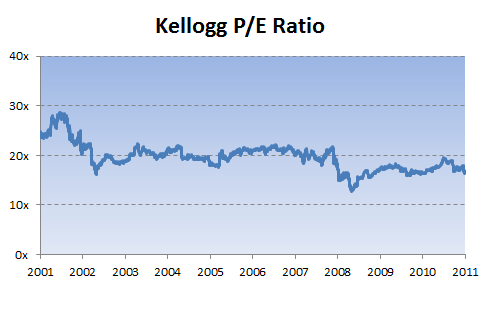A Brief History of Kellogg's Returns
Despite constant attempts by analysts and the media to complicate the basics of investing, there are really only three ways a stock can create value for its shareholders:
Dividends.
Earnings growth.
Changes in valuation multiples.
In this series, we drill down on one company's returns to see how each of those three has played a role over the past decade. Step on up, Kellogg (NYS: K) .
Kellogg shares returned 113% over the past decade. How'd they get there?
Dividends provided nearly half the return. Without dividends, shares returned 62% over the past 10 years.
Earnings growth was surprisingly strong. Kellogg's normalized earnings per share grew by an average of 9.2% per year from 2001 until today -- well above the market average, and impressive given the encroaching competition from generic store brands.
But if Kellogg's earnings grew by over 9% per year, why were shareholder returns slightly less? This chart helps explain why:

Source: S&P Capital IQ.
At about 25 times earnings, Kellogg shares were overvalued 10 years ago. The decline in valuation multiples ever since has prevented part of the company's earnings growth from turning into shareholder returns. The same was true at other food companies like General Mills (NYS: GIS) and Kraft (NYS: KFT) -- strong earnings growth was suppressed by falling valuation multiples.
The good news today is that, at around 16 times earnings, Kellogg shares aren't unreasonably valued, particularly given the strength of its earnings growth. Going forward, more of the company's earnings growth should translate into shareholder returns.
Why is this stuff worth paying attention to? It's important to know not only how much a stock has returned, but where those returns came from. Sometimes earnings grow, but the market isn't willing to pay as much for those earnings. Sometimes earnings fall, but the market bids shares higher anyway. Sometimes both earnings and earnings multiples stay flat, but a company generates returns through dividends. Sometimes everything works together, and returns surge. Sometimes nothing works and they crash. All tell a different story about the state of a company. Not knowing why something happened can be just as dangerous as not knowing that something happened at all.
Add Kellogg to My Watchlist.
At the time thisarticle was published Fool contributor Morgan Housel doesn't own shares in any of the companies mentioned in this article. Follow him on Twitter @TMFHousel. Motley Fool newsletter services have recommended buying shares of Kellogg. Try any of our Foolish newsletter services free for 30 days. We Fools may not all hold the same opinions, but we all believe that considering a diverse range of insights makes us better investors. The Motley Fool has a disclosure policy.
Copyright © 1995 - 2011 The Motley Fool, LLC. All rights reserved. The Motley Fool has a disclosure policy.

